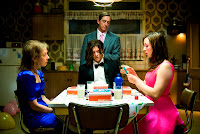
Icon Film Distribution
Now Showing
Although a remake of a French film (and aren’t they all, nowadays?), Wild Target is a very British film. An all-English cast, London setting and a sense of humour peculiar to the Brits, which will either delight you or give you the (sounds like Brits).
Victor Maynard (Bill Nighy) is a professional hitman, so devoted to his career – one with a long tradition in his family – that he hasn’t even had time to decide whether he’s gay or straight. That question is raised when he takes on two sidekicks: Rose (Emily Blunt), a beautiful but frustrating thief, and Tony (Harry Potter’s Rupert Grint), an innocent bystander who gets dragged along for the ride.
That ride begins when Victor, hired to kill Rose, decides he’d rather not. Tony happens to be nearby when a set of goons, hired by Ferguson (Rupert Everett), whom Rose double crossed in an art fraud, arrive to take out both Victor and Rose.
So ensues a dash across London in a too small car and an escape to Victor’s country estate where the odd trio regroup and Victor is faced with a choice between Rose and Tony. And no offense but he makes the right, albeit obvious, choice. (I’ve never known what it is Hermoine sees in Ron.)
I’m not a fan of Bill Nighy’s stiff-upper-lip from the lip down style of acting (admittedly a major hurdle to enjoying Jonathan Lynn's film) but I do love me some Emily Blunt. And while Rupert Grint is yet to prove himself post-Potter, he doesn't disgrace himself here.
Martin Freeman, on the other hand, as a rival hitman who seems to have an American dental plan, should be grateful he's already scored the lead role in Peter Jackson's The Hobbit. Eileen Atkins, as Victor's disapproving mother, should also have words with her agent.


















